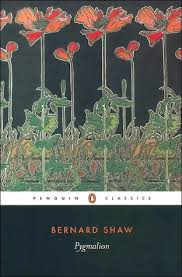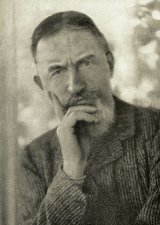Pygmalion Page #14
Pygmalion is a play by George Bernard Shaw, named after a Greek mythological figure. It was first presented on stage to the public in 1913. In ancient Greek mythology, Pygmalion fell in love with one of his sculptures, which then came to life.
MRS. HIGGINS [puzzled] Done her in? LIZA. Y-e-e-e-es, Lord love you! Why should she die of influenza? She come through diphtheria right enough the year before. I saw her with my own eyes. Fairly blue with it, she was. They all thought she was dead; but my father he kept ladling gin down her throat til she came to so sudden that she bit the bowl off the spoon. MRS. EYNSFORD HILL [startled] Dear me! LIZA [piling up the indictment] What call would a woman with that strength in her have to die of influenza? What become of her new straw hat that should have come to me? Somebody pinched it; and what I say is, them as pinched it done her in. MRS. EYNSFORD HILL. What does doing her in mean? HIGGINS [hastily] Oh, that's the new small talk. To do a person in means to kill them. MRS. EYNSFORD HILL [to Eliza, horrified] You surely don't believe that your aunt was killed? LIZA. Do I not! Them she lived with would have killed her for a hat-pin, let alone a hat. MRS. EYNSFORD HILL. But it can't have been right for your father to pour spirits down her throat like that. It might have killed her. LIZA. Not her. Gin was mother's milk to her. Besides, he'd poured so much down his own throat that he knew the good of it. MRS. EYNSFORD HILL. Do you mean that he drank? LIZA. Drank! My word! Something chronic. MRS. EYNSFORD HILL. How dreadful for you! LIZA. Not a bit. It never did him no harm what I could see. But then he did not keep it up regular. [Cheerfully] On the burst, as you might say, from time to time. And always more agreeable when he had a drop in. When he was out of work, my mother used to give him fourpence and tell him to go out and not come back until he'd drunk himself cheerful and loving-like. There's lots of women has to make their husbands drunk to make them fit to live with. [Now quite at her ease] You see, it's like this. If a man has a bit of a conscience, it always takes him when he's sober; and then it makes him low-spirited. A drop of booze just takes that off and makes him happy. [To Freddy, who is in convulsions of suppressed laughter] Here! what are you sniggering at? FREDDY. The new small talk. You do it so awfully well. LIZA. If I was doing it proper, what was you laughing at? [To Higgins] Have I said anything I oughtn't? MRS. HIGGINS [interposing] Not at all, Miss Doolittle. LIZA. Well, that's a mercy, anyhow. [Expansively] What I always say is-- HIGGINS [rising and looking at his watch] Ahem! LIZA [looking round at him; taking the hint; and rising] Well: I must go. [They all rise. Freddy goes to the door]. So pleased to have met you. Good-bye. [She shakes hands with Mrs. Higgins]. MRS. HIGGINS. Good-bye. LIZA. Good-bye, Colonel Pickering. PICKERING. Good-bye, Miss Doolittle. [They shake hands]. LIZA [nodding to the others] Good-bye, all. FREDDY [opening the door for her] Are you walking across the Park, Miss Doolittle? If so-- LIZA. Walk! Not bloody likely. [Sensation]. I am going in a taxi. [She goes out]. Pickering gasps and sits down. Freddy goes out on the balcony to catch another glimpse of Eliza. MRS. EYNSFORD HILL [suffering from shock] Well, I really can't get used to the new ways. CLARA [throwing herself discontentedly into the Elizabethan chair]. Oh, it's all right, mamma, quite right. People will think we never go anywhere or see anybody if you are so old-fashioned. MRS. EYNSFORD HILL. I daresay I am very old-fashioned; but I do hope you won't begin using that expression, Clara. I have got accustomed to hear you talking about men as rotters, and calling everything filthy and beastly; though I do think it horrible and unladylike. But this last is really too much. Don't you think so, Colonel Pickering? PICKERING. Don't ask me. I've been away in India for several years; and manners have changed so much that I sometimes don't know whether I'm at a respectable dinner-table or in a ship's forecastle. CLARA. It's all a matter of habit. There's no right or wrong in it. Nobody means anything by it. And it's so quaint, and gives such a smart emphasis to things that are not in themselves very witty. I find the new small talk delightful and quite innocent. MRS. EYNSFORD HILL [rising] Well, after that, I think it's time for us to go. Pickering and Higgins rise. CLARA [rising] Oh yes: we have three at homes to go to still. Good-bye, Mrs. Higgins. Good-bye, Colonel Pickering. Good-bye, Professor Higgins. HIGGINS [coming grimly at her from the divan, and accompanying her to the door] Good-bye. Be sure you try on that small talk at the three at-homes. Don't be nervous about it. Pitch it in strong. CLARA [all smiles] I will. Good-bye. Such nonsense, all this early Victorian prudery! HIGGINS [tempting her] Such damned nonsense! CLARA. Such bloody nonsense! MRS. EYNSFORD HILL [convulsively] Clara! CLARA. Ha! ha! [She goes out radiant, conscious of being thoroughly up to date, and is heard descending the stairs in a stream of silvery laughter]. FREDDY [to the heavens at large] Well, I ask you [He gives it up, and comes to Mrs. Higgins]. Good-bye. MRS. HIGGINS [shaking hands] Good-bye. Would you like to meet Miss Doolittle again? FREDDY [eagerly] Yes, I should, most awfully. MRS. HIGGINS. Well, you know my days. FREDDY. Yes. Thanks awfully. Good-bye. [He goes out]. MRS. EYNSFORD HILL. Good-bye, Mr. Higgins. HIGGINS. Good-bye. Good-bye. MRS. EYNSFORD HILL [to Pickering] It's no use. I shall never be able to bring myself to use that word. PICKERING. Don't. It's not compulsory, you know. You'll get on quite well without it. MRS. EYNSFORD HILL. Only, Clara is so down on me if I am not positively reeking with the latest slang. Good-bye. PICKERING. Good-bye [They shake hands]. MRS. EYNSFORD HILL [to Mrs. Higgins] You mustn't mind Clara. [Pickering, catching from her lowered tone that this is not meant for him to hear, discreetly joins Higgins at the window]. We're so poor! and she gets so few parties, poor child! She doesn't quite know. [Mrs. Higgins, seeing that her eyes are moist, takes her hand sympathetically and goes with her to the door]. But the boy is nice. Don't you think so? MRS. HIGGINS. Oh, quite nice. I shall always be delighted to see him. MRS. EYNSFORD HILL. Thank you, dear. Good-bye. [She goes out]. HIGGINS [eagerly] Well? Is Eliza presentable [he swoops on his mother and drags her to the ottoman, where she sits down in Eliza's place with her son on her left]? Pickering returns to his chair on her right. MRS. HIGGINS. You silly boy, of course she's not presentable. She's a triumph of your art and of her dressmaker's; but if you suppose for a moment that she doesn't give herself away in every sentence she utters, you must be perfectly cracked about her. PICKERING. But don't you think something might be done? I mean something to eliminate the sanguinary element from her conversation. MRS. HIGGINS. Not as long as she is in Henry's hands. HIGGINS [aggrieved] Do you mean that my language is improper? MRS. HIGGINS. No, dearest: it would be quite proper--say on a canal barge; but it would not be proper for her at a garden party.
Translation
Translate and read this book in other languages:
Select another language:
- - Select -
- 简体中文 (Chinese - Simplified)
- 繁體中文 (Chinese - Traditional)
- Español (Spanish)
- Esperanto (Esperanto)
- 日本語 (Japanese)
- Português (Portuguese)
- Deutsch (German)
- العربية (Arabic)
- Français (French)
- Русский (Russian)
- ಕನ್ನಡ (Kannada)
- 한국어 (Korean)
- עברית (Hebrew)
- Gaeilge (Irish)
- Українська (Ukrainian)
- اردو (Urdu)
- Magyar (Hungarian)
- मानक हिन्दी (Hindi)
- Indonesia (Indonesian)
- Italiano (Italian)
- தமிழ் (Tamil)
- Türkçe (Turkish)
- తెలుగు (Telugu)
- ภาษาไทย (Thai)
- Tiếng Việt (Vietnamese)
- Čeština (Czech)
- Polski (Polish)
- Bahasa Indonesia (Indonesian)
- Românește (Romanian)
- Nederlands (Dutch)
- Ελληνικά (Greek)
- Latinum (Latin)
- Svenska (Swedish)
- Dansk (Danish)
- Suomi (Finnish)
- فارسی (Persian)
- ייִדיש (Yiddish)
- հայերեն (Armenian)
- Norsk (Norwegian)
- English (English)
Citation
Use the citation below to add this book to your bibliography:
Style:MLAChicagoAPA
"Pygmalion Books." Literature.com. STANDS4 LLC, 2025. Web. 10 Jan. 2025. <https://www.literature.com/book/pygmalion_78>.




Discuss this Pygmalion book with the community:
Report Comment
We're doing our best to make sure our content is useful, accurate and safe.
If by any chance you spot an inappropriate comment while navigating through our website please use this form to let us know, and we'll take care of it shortly.
Attachment
You need to be logged in to favorite.
Log In